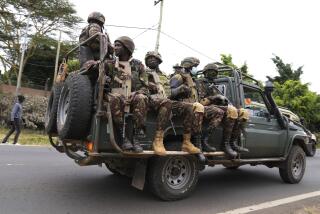Rift Emerges in Nepalese Opposition
- Share via
KATMANDU, Nepal — As the political stalemate here dragged on, pro-democracy protesters in the capital kept up their pressure on King Gyanendra on Sunday, but in smaller numbers and less violent clashes with authorities than in recent days.
Meanwhile, hundreds of Maoist rebels stormed police, government and telecommunications facilities in the town of Chautara, a rebel stronghold about 30 miles east of Katmandu, an official told Reuters news service today.
Demonstrators took to the streets of the Nepalese capital for the 18th consecutive day to demand that their monarch restore democratic government to this Himalayan kingdom, which has been under absolute rule from the palace for more than a year. Sporadic confrontations with riot police erupted, resulting in several injuries, but far fewer than the scores reported in much larger melees Saturday.
At the largest rally, which attracted about 3,000 people under sunny skies, leaders of the political coalition arrayed against the king urged people to show their defiance without violence. The politicians also called for a massive rally Tuesday to assert popular control of the ring road that encloses the city center, where Gyanendra remains holed up in his salmon-colored palace.
“The king’s rule is only inside the ring road. Outside the ring road, the people rule,” said Bamdev Gautam, a coalition leader from one of Nepal’s communist parties. “We should capture all the ring road first.”
Cheers rang out from the peaceful throng. On Saturday, tens of thousands had flooded the streets and attempted to puncture the police cordon around the city center in order to reach the palace.
Organizers attributed Sunday’s lower turnout to a desire to regroup and also to the shutdown of Nepal’s cellphone networks, which prevented protesters, many of them young people, from spreading the word via calls and text messages.
Gautam and other opposition figures who called for abolishing the monarchy drew cheers from the crowds, which have become increasingly vociferous about their desire for a republic since the deaths of at least 12 protesters at the hands of police in recent days.
“Our aim is to make King Gyanendra like us, an ordinary citizen,” Gautam declared.
But in a sign of the differences that make the seven-party opposition alliance a somewhat fragile one, other leaders stopped short of demanding a republic and spoke of leaving a decision on the monarchy to a special assembly that would rewrite Nepal’s constitution.
In an interview, Prakash Mahat of the Nepali Congress party denied reports that the alliance had given Gyanendra a 24-hour deadline Saturday to respond to opposition demands after opposition leaders rejected his offer Friday for them to name a new prime minister.
“There’s no point to even talk about a deadline. More and more people are coming to participate in our movement,” Mahat said. He added, however, that if the king “waits too long, he will be forced out.”
Analysts say the seven-party alliance is in a tricky position, buoyed by the outpouring of popular anger against the king but also in danger of being swept aside if protesters start to view the coalition as too slow or too weak in dealing with Gyanendra.
Despite warnings from some observers that an overthrow of the monarchy could result in chaos or the seizure of power by armed Maoist rebels, whose insurgency in the Nepalese countryside has cost an estimated 13,000 lives, some demonstrators were nonchalant.
“Construction is possible after destruction,” said journalism student Sangam Poudel, 22.
The king sacked his government 14 months ago, saying he needed unfettered power to crush the Maoists. The rebels have signed a loose accord with the opposition groups to respect multiparty democracy as long as a constitutional assembly is called to decide the fate of the monarchy. They have continued to carry out attacks, however.
Gyanendra and his handpicked ministers maintain that Maoists have infiltrated the protests of the last two weeks, making the police crackdown justified.
This is partly why opposition leaders have been keen to drive home to demonstrators that their movement must be peaceful, giving authorities no excuse for force. Tuesday’s rally will put that to the test.
On Sunday, scuffles with police broke out at smaller protests around Katmandu. Four people were reported wounded in one conflict.
More to Read
Sign up for Essential California
The most important California stories and recommendations in your inbox every morning.
You may occasionally receive promotional content from the Los Angeles Times.














